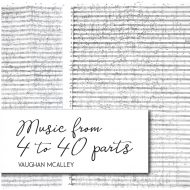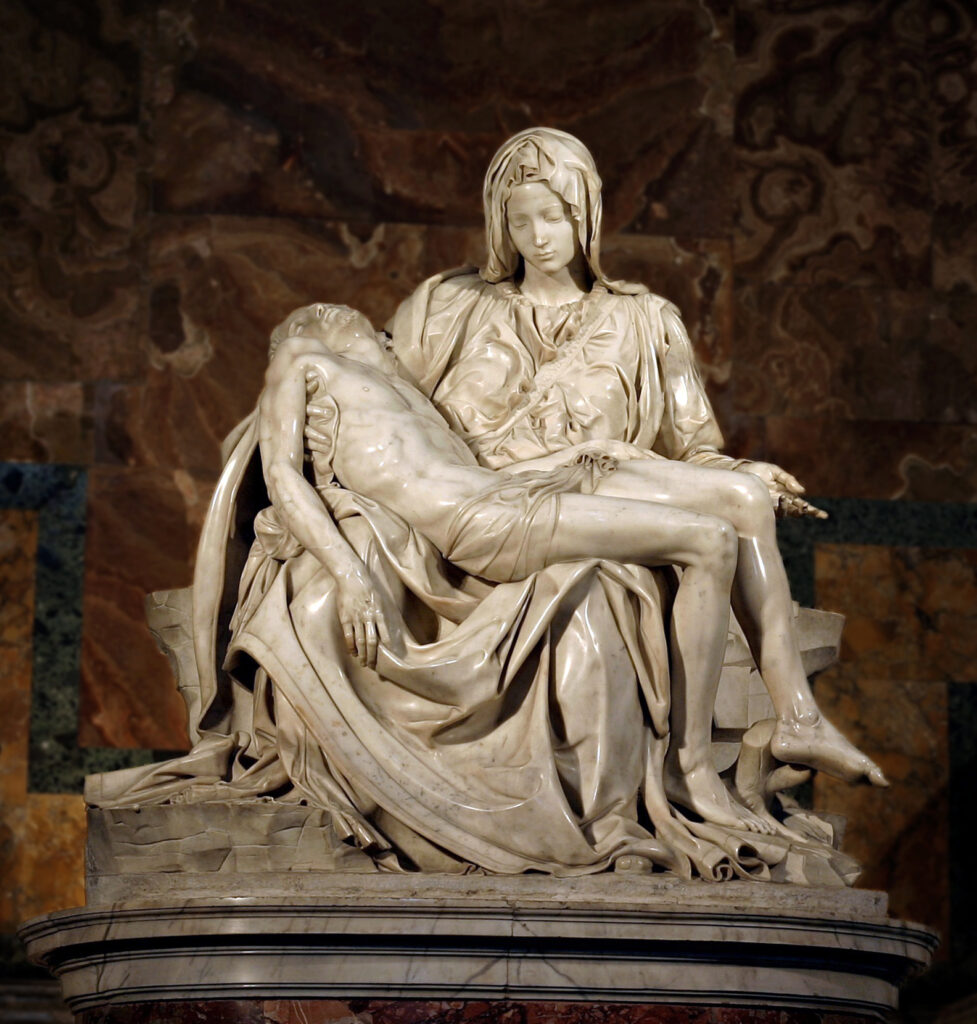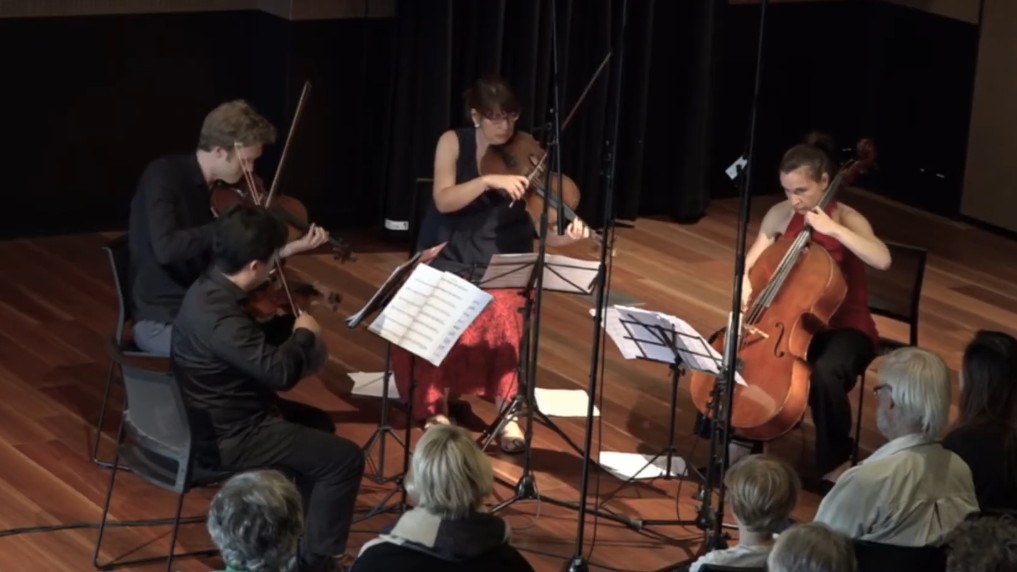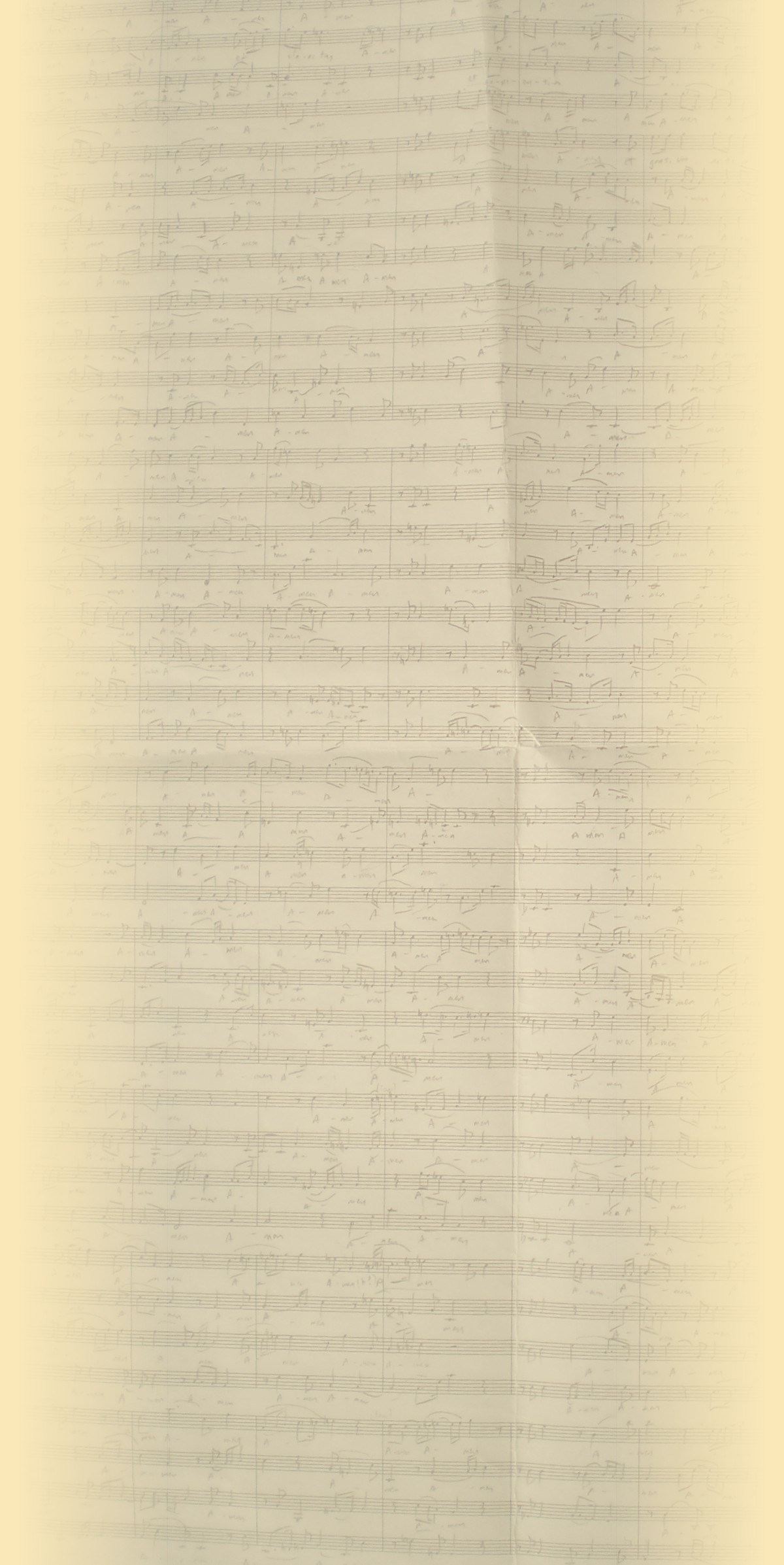A contemporary audio meditation on the Stations of the Cross
Album out now: listen on Apple Music, Spotify, YouTube, YouTube Music.
Photograph by Stanislav Traykov CC BY 2.5
In the year 2000 I was commissioned to compose a piece for the inauguration of the ecumenical Way of the Cross march, organised by Melbourne City Churches in Action. The sculptor Anna Meszaros created fourteen stations that stand in various city churches, and every Good Friday a large group of people marches around the city, with prayer and meditation at every station. The eleventh station—Jesus speaks to the good thief—can be found outside Scots’ Church in Collins St. Since then, I have enjoyed looking at various sculptures and paintings of the Way of the Cross in Australia and Europe.
This album began as a lunchtime concert for Holy Week at the Scots’ Church in Melbourne. Instead of assembling some singers and singing renaissance music like I usually do, I decided to try something more contemporary. This concert was intended to be a meditation on selected stations of the cross, revealing the emotions behind the stations with simple singing of carefully-chosen songs. Some of the songs are sacred, some are secular, and some in between, but I intend that they all convey a personal impression of Christ’s passion.
Overview
The Last Supper: Farewell.
The Parting Glass (Scottish & Irish traditional)
The Garden of Gethsemane: Fear
Gethsemane from Jesus Christ, Superstar (lyrics by Tim Rice, music by Andrew Lloyd-Webber)
Peter’s betrayal of Jesus: Regret
Have mercy on me / Dido’s Lament (lyrics from Psalm 51, music by Henry Purcell)
Jesus scourged and crowned with thorns: Pain
Improvisation (Tony Gould)
Jesus is crucified: Desolation
Were you there when they crucified my Lord? (African-American spiritual)
Jesus speaks to Mary and John: Death of one’s child
Tears in Heaven (Eric Clapton & Will Jennings)
Jesus dies on the cross: Staring into the void; abandonment
Improvisation (Tony Gould)
Jesus is taken down from the cross: Pietà
Sweet Lullaby (Traditional Baeggu lullaby, as interpreted by Emma Gilmartin, Tony Gould)
Jesus rises from the dead: Hope
The White Cliffs of Dover (Nat Burton & Walter Kent)
Prepare ye the way of the Lord from Godspell (John-Michael Tebelak & Stephen Schwarz)
The Last Supper: Farewell
The Parting Glass (Scottish & Irish traditional)
The Parting Glass is a beloved song of farewell in Scotland and Ireland, possibly the most popular farewell song in Scotland before Robbie Burns wrote Auld Lang Syne. The words have been around since at least 1600, and the music was first published in 1782.
Lyrics:
Oh all the comrades e’er I had:
They’re sorry for my going away,
And all the sweethearts e’er I had:
They’d wish me one more day to stay,
But since it falls unto my lot
I’ll gently rise and softly call
That I should go and you should not:
Good night and joy be with you all.
(Return to overview)
The Garden of Gethsemane: Fear
Gethsemane from Jesus Christ, Superstar (lyrics by Tim Rice, music by Andrew Lloyd-Webber)
Jesus Christ, Superstar made a significant step in its long journey from controversy to respectability when Steve Balsamo sang Gethsemane on the BBC’s Songs of Praise in 2008. It is a powerful imagining of Jesus’ prayer in the Garden of Gethsemane, with Jesus pleading, bargaining, and being angry with God before finally and reluctantly accepting his fate.
Lyrics:
I only want to say
If there is a way:
Take this cup away from me
For I don’t want to taste its poison,
Feel it burn me—
I have changed I’m not as sure
As when we started
Then I was inspired
Now I’m sad and tired
Listen surely I’ve exceeded
Expectations
Tried for three years
Seems like thirty
Could you ask as much
From any other man?
But if I die:
See the saga through
And do the things you ask of me–
Let them hate me, hit me, hurt me,
Nail me to their tree
I’d want to know,
I’d want to know, my God,
I’d want to see, my God,
I’d want to see,
I’d want to see, my God,
Why I should die
Would I be more noticed
Than I ever was before?
Would the things I’ve said and done
Matter any more?
I’d have to know,
I’d have to know, my Lord,
I’d have to see,
I’d have to see, my Lord,
If I die what will be my reward?
I’d have to know,
I’d have to know, my Lord,
I’d have to know,
I’d have to know, my Lord,
Why should I die?
Oh, why should I die?
Can you show me now that I would not be killed in vain?
Show me just a little of your omnipresent brain
Show me there’s a reason for your wanting me to die
You’re far too keen on where and how but not so hot on why
Alright I’ll die!
Just watch me die!
See how, see how I die!
Oh, just watch me die!
Then I was inspired,
Now I’m sad and tired,
After all I’ve tried for three years–
Seems like ninety.
Why then am I scared
To finish what I started,
What you started,
I didn’t start it.
God thy will is hard–
But you hold every card
I will drink your cup of poison
Nail me to your cross and break me
Bleed me, beat me
Kill me, take me now
before I change my mind.
(Return to overview)
Peter’s betrayal of Jesus: Regret
Have mercy on me / Dido’s Lament (lyrics from Psalm 51, music by Henry Purcell)
I wanted to find a song about the kind of regret that makes you want to weep as Peter did when he realised how badly he had let Jesus down. I looked through a large number of songs, before realising that none of them expressed regret quite as well Psalm 51. This psalm was written by King David when the prophet Nathan pointed out how badly he had misused his power, effectively murdering Uriah to be able to marry Uriah’s wife Bathsheba. I have fitted the words to the music of Dido’s Lament by Purcell, one of the great “ground bass” arias, and one that has been interpreted by many traditional and modern musicians.
Lyrics:
Have mercy upon me, O God,
according to thy lovingkindness:
my sin is ever before me.
(Return to overview)
Jesus is scourged and crowned with thorns: Pain
Improvisation (Tony Gould)
(Return to overview)
Jesus is crucified: Desolation
Were you there when they crucified my Lord? (African-American spiritual)
The top of a cross would undoubtedly be a lonely place. This very famous spiritual was most likely composed by African-American slaves in the nineteenth century, and was first printed in 1899. Its simple and direct expression makes it an especially effective piece to sing without accompaniment.
Lyrics:
Were you there when they crucified my Lord?
Were you there when they crucified my Lord?
O! Sometimes it causes me to tremble! tremble! tremble!
Were you there when they crucified my Lord?
Were you there when they nailed him to the cross?
Were you there when they nailed him to the cross?
O! Sometimes it causes me to tremble! tremble! tremble!
Were you there when they nailed him to the cross?
Were you there when they pierced him in the side?
Were you there when they pierced him in the side?
O! Sometimes it causes me to tremble! tremble! tremble!
Were you there when they pierced him in the side?
Were you there when the sun refused to shine?
Were you there when the sun refused to shine?
O! Sometimes it causes me to tremble! tremble! tremble!
Were you there when the sun refused to shine?
(Return to overview)
Jesus speaks to Mary and John: Death of one’s child
Tears in Heaven (Eric Clapton & Will Jennings)
This scene, where Jesus tells his mother and John to look after each other, is very touching. Emotionally, I wanted to turn it around and think of the scene from Mary’s point of view. Losing a child is devastating, and then being new father, I could glimpse just how devastating it might be. Tears in Heaven was written by Eric Clapton after the tragic death of his four-year-old son Conor. He was able to channel his grief into this heartfelt song that speaks to parents and non-parents alike.
Lyrics:
Would you know my name
If I saw you in heaven?
Would it be the same
If I saw you in heaven?
I must be strong and carry on
‘Cause I know I don’t belong here in heaven
Would you hold my hand
If I saw you in heaven?
Would you help me stand
If I saw you in heaven?
I’ll find my way through night and day
‘Cause I know I just can’t stay here in heaven
Time can bring you down, time can bend your knees
Time can break your heart, have you begging please, begging please
Beyond the door there’s peace I’m sure
And I know there’ll be no more tears in heaven
Would you know my name
If I saw you in heaven?
Would it be the same
If I saw you in heaven?
I must be strong and carry on
‘Cause I know I don’t belong here in heaven
(Return to overview)
Jesus dies on the cross: Staring into the void; abandonment
Improvisation (Tony Gould)
(Return to overview)
Jesus is taken down from the cross: Pietà
Sweet Lullaby (Traditional Baeggu lullaby, as interpreted by Emma Gilmartin & Tony Gould)
This song is the first track on Emma Gilmartin’s album with Tony Gould, and is much of the inspiration for the whole album. The idea of the Pietà (a picture or sculpture of Mary cradling the dead Jesus) developed in Germany around 1300 and gradually gained popularity around Europe. I have seen many beautiful examples in Europe, the most extraordinary and moving being Michelangelo’s famous sculpture in Rome. Perhaps Mary is thinking back to when she cradled and sang her infant son to sleep, as she says goodbye to him for the last time.
Lyrics:
Sleep in peace; be still, I am here for you,
Dream away, you are safe in my arms,
Through the long, long night to the morning
No need to drown now the page is turned over,
Close your eyes and breathe in the silence,
You will find peace and time to love again.
Through the long, long night to the morning
Hide away from the world you remember,
Though you feel so far from the answer
You will find peace and time to love again.
(Return to overview)
Jesus rises from the dead: Hope
The White Cliffs of Dover (Nat Burton & Walter Kent)
Prepare ye the way of the Lord from Godspell (John-Michael Tebelak & Stephen Schwarz)
Jesus’ resurrection is a relatively recent addition to the Way of the Cross. After his death, Jesus’ friends and disciples were in mourning. In hindsight, we know that Easter is coming, but it is still Lent, so the miracle of Easter is more of a dim light at the end of a long bleak tunnel. The White Cliffs of Dover, made famous by Dame Vera Lynn, offered the prospect of eventual hope during the darkest days of World War II.
The program ends with a beginning: the first song from Godspell. Just as John the Baptist wants people to prepare for the coming of the Christ, we should be preparing for the Kingdom of God that will have its genesis on Easter morning.
Lyrics:
There’ll be bluebirds over
The white cliffs of Dover
Tomorrow–
Just you wait and see.
There’ll be love and laughter,
And peace ever after
Tomorrow–
When the world is free
The shepherd will tend his sheep,
The valley will bloom again,
And Jimmy will go to sleep,
In his own little room again.
There’ll be bluebirds over
The white cliffs of Dover
Tomorrow–
Just you wait and see.
Prepare ye the way of the Lord,
Prepare ye the way of the Lord.
(Return to overview)





